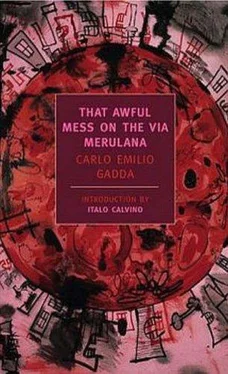He thought he could guess: they have no children. "Et cetera et cetera," he had then added once, in speaking with his colleague Doctor Fumi, as if alluding to a well-known phenomenology, an experience that was clearly defined and in public domain. He knew Balducci as a hunter, and a lucky hunter. Hunter in utroque. In his heart of hearts Ingravallo reproached him for a certain masculine vulgarity, a way of bragging, of laughing a bit too loud though always kindly, a certain egoism or egotism, a bit like the common womanizer: and with such a wife! One would have said, if one had felt like fantasticating, that Balducci had not evaluated, had not penetrated all her beauty: all that was noble and recondite in her: and then. . children had not come. As if because of a gamic incompatibility of their two spirits. Children descend from an ideal compenetration of the parents. But she loved him: he was the father in her image, the male and father, in virtue if not in facto, in possibility if not in act. He had been the possible father of hoped-for offspring. Of his fidelity, perhaps, she was not even sure: as for that, she felt that her unfulfilled maternity might justify some venatorial wandering of her husband, some curiosity, some extravagance of the male and possible father, desirous at every turn, like all males. "Try with another person!" What she would never have even dared imagine for herself (matrimony is a sacrament, one of the seven granted us by Our Lord), she didn't want, no, for him: even Don Corpi said it was a bad thing, on the part of a Christian husband: but after all… one must be patient in all things: prudent and patient. Don Lorenzo Corpi was a good soul whom one could trust completely. And "prudence" was one of the four cardinal virtues.
All this Ingravallo had partially sensed and partially filled out with some hints of Balducci's, or with these gentle "moments" of her sadness: and the name of Don Corpi, Don Lorenzo, Don Lorenzo Corpi often shone, too, in Signora Liliana's conversation. To hell with Don Lorenzo! One would have said that in every big man she venerated… an honorary father, a potential father, even in Don Lorenzo, yes, despite his black cassock, despite the sacramental incompatibility, of the two sacraments which were… divergent.
Even in Don Lorenzo. Who must have been something of a tower of strength, that mule. One of those men, to judge from certain remarks of hers, who have to stoop every time they go through a door. At least he must have had the δύναμις of a father. Don Ciccio was rather well-versed in such matters: a vivid intuition, and dating from his years of puberty: opened afterwards to all the demotic encounters of his race, "fertile in works and brave in arms" (to quote D'Annunzio): native genius rather than systematic course of reading. From the dense teeming of generations, from police station guard rooms, from Latium to Marsica, from Picenum to Sannium, or even to his own Molisan hill: hard mountains, hard heads, hard luck! And the holy, unremembering validity of the matrixes. Among his people, rich in children, he had been able to distinguish the facts of prolification from those of non-prolification. What began to amaze him, nonetheless, was that the reservoir of Bal-ducci's nieces was brimming with such buxom or such sweet nieces: or at least, this present one was sweet, while the others simply stupendous. In the time that he had been seeing this couple, he had already met three or four. And there was another thing: once a niece was off the scene, it was as if she had died. She never came to the surface again. Like a consul or the president of a republic, when his term has expired.
Don Ciccio was about to glimpse the bottom of the last, so-to-speak, chalice — an extra-dry white, five years old, now, from Cavalier Gabbioni Empedocle and Son, Albano Laziale, something to dream of even at the station, the wine, the glass, the father, son, and holy Lazio — when the burden of his private opinions on the affective (he even said erotic) concomitant causes of human events led him to consider, obviously, that a niece in such conditions wasn't an ordinary niece, a Luciana or an Adriana, who comes today to the city to stay with Auntie and Uncle, then goes away, then comes back, then telegraphs, then leaves, then reaches home, then sends a postcard with love and kisses, then is in town again from Viterbo or from Zagarolo because she has to see the dentist again, and so on and on.
"This here's a more mixed-up kind of a niece," he muttered to himself, with that white wine back in Porta Paradisi still tickling his velum pendulum. Yes, yes. Behind that noun "niece" there must be hidden a whole tangle… of threads, a cobweb of feelings, of the rarest and most. . delicate nature. She. He. She, out of respect for him. He, out of regard for her. So she dug up this niece, after years: suffering and weeping at night, and during the day candles to Sant'Antonio in all the churches of Rome: and hopes, taking the cure at Salsomaggiore, and other cures at home, and examinations by Professor Belt-ramelli and Professor Macchioro. And with each new candle, a hope. And with each new hope, a new doctor.
She dug up this Gina, poor Ginetta! But before Ginetta the story had quite a different direction, a different flavor. A strange thing, indeed it is, thought Ingravallo.
Virginia! (her image was a flash of glory, a sudden thunderbolt in the darkness): and before Virginia, that other one from Monteleone, what was her name? And the maids! Of course they flutter off like sparrows at the first rustling caprice: but the Balduccis, seriously! you might say, had a new one every month. A thought came to him, and a disrespectful word: it was the wine.
Signora Liliana, since she couldn't dish up any of her own. . And so every year: the change of niece must have been, in her unconscious mind, a symbol, in place of the one she failed to dish up herself. As for his mother, who had had eight, the real child every new spring. Those born in May are children of August. "A good month!" Don Ciccio thought, "even for cats: the racket they make around here, some nights."
Year after year… a new niece: as if to symbolize, in her heart, the successive births. "Jedes Jahr ein Kind, jedes fahr ein Kind. ." that German used to sing to him in Anzio: the one who looked like a seal.
And he, he, the hunter (Ingravallo looked at him), what does he feel, what does he experience, inside, when the niece arrives in his house, the niece whose turn it is? What had he thought of the various. . nieces?
For her, from the Tiber down, there, there beyond the crumbling castles, and after the blond vineyards, there was, on the hills and mountains, and in the brief plains of Italy, a kind of great fertile womb, two swollen Eustachian tubes, streaked with an abundance of granules, the granular and greasy, the happy caviar of the race. From time to time, from the great Ovary ripened follicles opened, like pomegranate seeds: and red grains, mad with amorous certitude, descended upon the city, to encounter the male afflatus, the vitalizing impulse, that spermatic aura of which the ovarists of the eighteenth century wrote their fantastic treatise. And at Via Merulana two hundred and nineteen, stairway A, third floor, the niece re-burgeoned, in the best of cores, there, in the palace of gold.
The niece! The Alban niece, flower of the eternal Sabellian people. The afflatus of the predators. Yes. There was no need to seize those Sabine women… so radically! waiting for the night's mediation, the warm flesh of dawn. The Alban women, nowadays, came down to the river-banks on their own. And the river flowed on, and on, overcoming all din, to reach, at the sea's edge, the inexorable, waiting eternity.
But what about him? Signor Balducci? What did he, the hunter, think of the Alban niece, the Tiburtine?
Читать дальше












